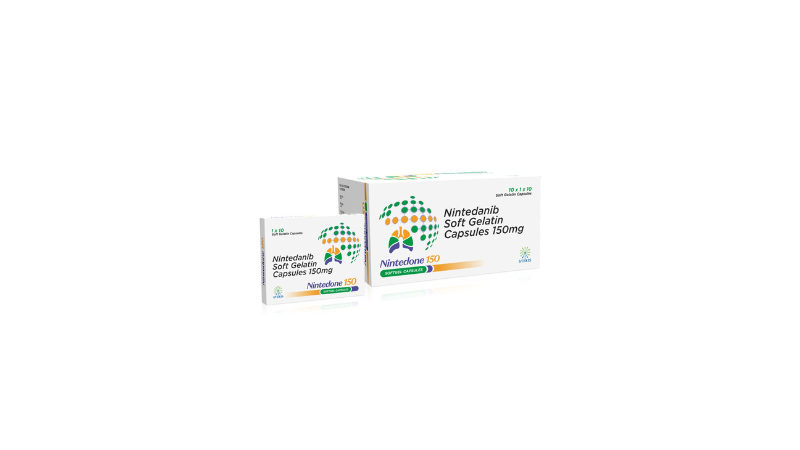Nintedanib 150 mg Uses, Dosage & Mechanism of Action
Sep 04, 2025
Living with chronic lung diseases like Idiopathic Pulmonary Fibrosis (IPF) or progressive fibrosing interstitial lung diseases (PF-ILDs) can be overwhelming. Breathlessness, chronic cough, and fatigue can severely affect your quality of life. Fortunately, NINTEDONE 150, which contains nintedanib 150 mg, is a clinically proven treatment that helps slow the progression of these serious conditions.
Designed to manage fibrosis at the cellular level, nintedanib 150 mg is a targeted treatment option that works at the root cause of fibrosis — abnormal scarring in the lungs.
What is Nintedanib 150 mg?
Nintedanib 150 is an oral anti-fibrotic medication approved for treating:
-
Idiopathic Pulmonary Fibrosis (IPF)
-
Systemic sclerosis-associated interstitial lung disease (SSc-ILD)
-
Other progressive fibrosing interstitial lung diseases (PF-ILDs)
Sold under the brand name NINTEDONE 150 by Steris Healthcare, this medication helps slow lung function decline and improves overall disease stability.
Nintedanib 150 mg Uses
The main nintedanib 150 mg uses include:
-
Slowing the progression of idiopathic pulmonary fibrosis
-
Reducing fibrosis in patients with systemic sclerosis-associated ILD
-
Managing progressive fibrosing interstitial lung disease (PF-ILDs)
-
Delaying lung capacity loss in fibrotic patients
It is not a cure, but NINTEDONE 150 can significantly slow disease progression and help patients maintain a better quality of life.
Nintedanib Mechanism of Action
Understanding how a drug works helps patients feel more confident in their treatment. The nintedanib mechanism of action is based on its ability to inhibit multiple tyrosine kinases:
-
It blocks fibroblast growth factor receptors (FGFR)
-
Inhibits platelet-derived growth factor receptors (PDGFR)
-
Inhibits vascular endothelial growth factor receptors (VEGFR)
By targeting these pathways, nintedanib helps slow down fibrosis (scarring) in the lungs and prevents abnormal tissue growth. This mechanism makes it unique and effective in treating fibrotic lung diseases.
How Long Does Nintedanib Take to Work?
Many patients ask, how long does nintedanib take to work? Clinical studies have shown that:
-
Nintedanib 150 mg may begin to slow lung function decline within 2 to 4 weeks of starting treatment.
-
The beneficial effects accumulate over time, especially with consistent use over 6 to 12 months.
-
It's important to continue the treatment regularly even if immediate results are not seen.
Remember: NINTEDONE 150 is a long-term therapy meant to manage disease progression, not provide instant relief.
Dosage of Nintedanib 150 mg
-
Recommended Dose: Usually, one 150 mg capsule twice daily, approximately 12 hours apart, or as prescribed by a doctor.
-
Administration: Take with food to minimize gastrointestinal side effects.
-
Missed Dose: If you miss a dose, take it as soon as remembered unless it’s near the next dose. Do not double up.
Important: Always follow your doctor’s instructions. Dosage adjustments may be needed in case of liver problems or side effects.
How Long Does Nintedanib Take to Work?
Patients may start noticing stabilization in lung function after a few weeks to a few months, depending on disease severity. Consistent, long-term use is essential to slow disease progression effectively.
Nintedanib 150 mg Side Effects
Most patients tolerate Nintedanib well, but some may experience:
-
Diarrhea or loose stools
-
Nausea or vomiting
-
Abdominal pain
-
Liver enzyme abnormalities (requires monitoring)
-
Fatigue or decreased appetite
Serious but rare side effects include liver injury, bleeding, or cardiovascular issues. Regular monitoring of liver function and clinical follow-ups are essential.
Precautions and Safety
-
Inform your doctor if you have liver disease, bleeding disorders, or cardiovascular problems.
-
Avoid taking blood-thinning medications unless prescribed and monitored.
-
Pregnant or breastfeeding women should avoid this medicine unless advised by a specialist.
-
Do not start, stop, or adjust the dose without consulting your healthcare provider.
Why Choose Steris Healthcare’s NINTEDONE 150?
-
High-quality manufacturing: WHO-GMP certified for patient safety.
-
Trusted formulation: Accurate dosage of Nintedanib for consistent therapeutic effect.
-
Affordable and widely available across India.
-
Doctor-recommended brand: Trusted by healthcare professionals for managing chronic lung diseases.
Choosing NINTEDONE 150 ensures patients receive a reliable, effective, and safe therapy for lung fibrosis management.
Frequently Asked Questions
Q1. What is Nintedanib 150 mg used for?
It is primarily used to manage idiopathic pulmonary fibrosis and other chronic fibrosing lung diseases.
Q2. How should I take Nintedanib 150 mg?
Take one capsule twice daily with food, or as prescribed by your doctor.
Q3. How long does it take to see results?
Patients may notice stabilization of lung function after several weeks to months of regular use.
Q4. Can children take Nintedanib?
Nintedanib is generally prescribed for adults; pediatric use should only be under specialist guidance.
Q5. What are common side effects?
Diarrhea, nausea, abdominal pain, and fatigue are common; serious effects like liver problems are rare but require monitoring.
Conclusion
The Nintedanib 150 mg capsule is a valuable option for patients struggling with lung fibrosis and related chronic lung diseases. By slowing disease progression and protecting lung function, it improves quality of life and reduces complications associated with pulmonary fibrosis.
For trusted lung disease management, choose NINTEDONE 150 from Steris Healthcare – a brand committed to quality, safety, and patient well-being.
Take control of your lung health today. Consult your doctor about NINTEDONE 150 mg from Steris Healthcare and ensure effective management of pulmonary fibrosis.
Recent Post

Trazodone Hydrochloride 100 mg and 50 mg Tablets for Depression

Baclofen Tablet | Uses, Dosage, Side Effects & Benefits

How Remogliflozin 100 mg Helps Lower Blood Sugar & Aid Weight Loss

Antioxidant Therapy in Chronic Conditions: Clinical Value of STYLECYSTIN ENDO

rosuvastatin ezetimibe tablet : uses, benefits, dosage, side effects

How Citicoline and Piracetam Work Together for Brain Power

How to Apply Clindamycin Nicotinamide Gel Correctly

Best Keratin and Biotin Shampoo for Men & Women | DANDROPHYTE

How Ferric Pyrophosphate Syrup Boosts Hemoglobin Faster Than Regular Iron

Tedizolid Phosphate 200 mg: A Potent Option for Resistant Skin Infections

